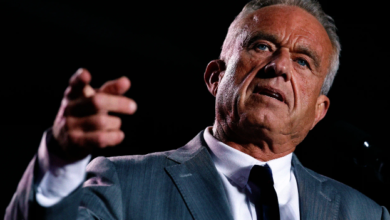Operation Lone Star Task Force ‘Holding The Line’ Against Cartel Traffickers But ‘Can’t Stop Everyone’

By (The Center Square)
A 20-agency Operation Lone Star Task Force is making headway interdicting cartel and gang activity stemming from the Texas-Mexico border along a major trafficking route to the so-called sanctuary city of Houston, officials say.
Task force participants have been described by many in law enforcement as the linebackers and safeties on a football team who act as the last line of defense against a massively funded and manned criminal enterprise.
Goliad County Sheriff Roy Boyd formed the task force and called out of semi-retirement a 40-year-plus law enforcement veteran, John Davis, to lead it. Davis says he’s never seen such a volume of people and drugs being moved north as he has since President Joe Biden took office. And with no defensive linemen at the line of scrimmage – the Rio Grande River – preventing cartels from having operational control of the border, task force members are battling unprecedented levels of crime, they say.
The criminal element has gotten so dangerous that Gov. Greg Abbott last month declared Mexican drug cartels as foreign terrorist organizations and called on Biden to do the same.
For years, multiple law enforcement agencies have combatted traffickers of people, weapons, drugs, money and stolen cars along highways 281, 77 and 59. But with an influx of people and drugs coming in from the border, cartel scouts are now searching in small towns and rural counties for locations to embed their operations, the task force said.
Related: Texas Employs Novel Tactic To Counter Biden Admin Releasing Illegal Immigrants Into U.S.
Davis said cartels “will come and set up in your back yard if you’re not fighting them. If you show no resistance to their efforts they will move into your area.”
Biden’s “open border policies,” members of the task force argue, have emboldened cartel activity, inundating small rural communities with crime they don’t have the resources to combat.
Support Conservative Voices!
Sign up to receive the latest political news, insight, and commentary delivered directly to your inbox.
Were it not for Abbott’s OLS funding, Davis told The Center Square, the task force wouldn’t exist and these communities “would be in very, very dire straits. These sheriffs and police chiefs cannot handle the flow we’ve seen coming through on their own.
“Operation Lone Star funding is vital to the success of the safety of our citizens,” he added. Without it, he said, “it would be open season for the cartels. We are mitigating the consequences of the federal government’s refusal to follow the constitution and secure the border.”
Task force members include 12 sheriff’s offices, seven city police departments and a county attorney’s task force. They stretch from Wharton County in the north to Gonzalez and Wilson counties to the northwest, McMullen County to the west and Brooks County to the south.
It’s dangerous work, Davis said.
“This may not be a declared war,” he said, “but it’s a war. I’ve spent my entire adult life doing this, but we get beat on a daily basis.” Despite their best efforts, Davis said task force members estimate they’re only catching 10% of those coming through.
During a 48-hour Refugio-Goliad Enhanced Interdiction, Investigation, and Intelligence Operation, for example, task force members made 110 traffic stops, 26 arrests, apprehended 13 foreign nationals in the country illegally including three fugitives (five warrants cleared), made five felony arrests, four misdemeanor arrests, apprehended one juvenile, recovered two stolen vehicles, seized two vehicles and three firearms, and made five drug seizures.
In a 96-hour operation in Live Oak and McMullen counties, task force members made 323 traffic stops, engaged in 12 vehicle pursuits including five bailouts, made 49 arrests including 15 felonies, 10 misdemeanors, six warrants, and turned over 18 illegal foreign nationals to Border Patrol. They made seven drug seizures, recovered four stolen vehicles and seized four vehicles and seven weapons.
“We can’t stop everyone heading north to Houston. We can’t secure the border. We can’t stop the floodgates of illegal immigration. But we are holding the line doing our part,” Davis told The Center Square.
“Cartel operatives are recruiting college kids,” he said. “They advertise on TikTok. They recruit in bars, on social media, at truck stops, and offer large sums of money to move their cargo – humans – north,” he said. “One reason this is so dangerous is because there’s often no ventilation in the 18-wheelers. They’re hauling scores of people with no water and no air and are willing to lose 10-15 people a truck load to get to Houston.”
Related: Texas Forced To Increase Border Security Spending By $500 Million As Biden Title 42 Changes Loom
In one case, an 18-wheeler was loaded with 84 people ready to head north, offficials said. Cartels just needed a driver, so they went on social media and published an ad offering $70,000 to anyone to drive the truck. Shared intelligence resulted in law enforcement in a border county finding the truck and rescuing everyone inside.
“There’s no way you can do this by individual county,” Davis said. “We have to work as a team as a force multiplier.”
Unlike other task forces that operate out of a central location, they work in their respective counties and cities sharing intelligence in real time to track and interdict criminal activity. As cartel scouts shift directions, they surge resources to intercept them.
“It all comes down to counties that are willing to fight,” Davis said. “If other counties to the west and along the western corridor were to establish their own task force, you’d see some of the same success we’ve seen.”
Syndicated with permission from The Center Square.
[ad_2]
Source link





